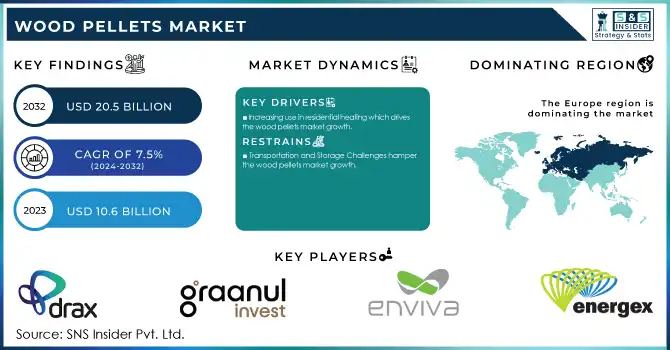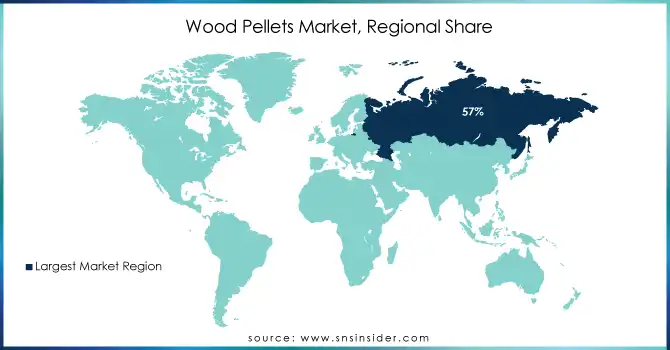Wood Pellets Market Size & Overview:

Get E-PDF Sample Report on Wood Pellets Market - Request Sample Report
The Wood Pellets Market size was USD 10.6 billion in 2023 and is expected to reach USD 20.5 billion by 2032 and grow at a CAGR of 7.5% over the forecast period of 2024-2032.
The increasing demand for biomass energy is a key driver for the growth of the wood pellets market, as countries increasingly prioritize sustainable and carbon-neutral energy solutions. Biomass energy has now become an alternative to fossil fuel in power generation and has increased growing interest as a cleaner burning biomass source in, for example, wood pellets for applications in space heating. There is a huge demand for it in sectors like Europe where stringent emissions regulations (EU’s Renewable Energy Directive II or RED II) support renewable sources. Moreover, Japan and South Korea have been ramping up imports of wood pellets for power generation as the two Asian countries move to meet stringent renewable energy goals. Another aspect that helps with switching to biomass energy from coal power is its compatibility to be co-fired with existing coal power plants, providing industries with a low-carbon path without significant upfront costs for infrastructure investment. Biomass energy can be used for various end uses, and the government incentives and subsidies, which drive more consumption of wood pellets, are ensuring its position in the global energy mix.
The European Union’s Renewable Energy Directive II (RED II) mandates that 32% of energy consumption across member states must come from renewable sources by 2030, significantly boosting the use of biomass, including wood pellets, for electricity and heating.
Technological innovations in the manufacturing of pellets are crucial for improving the overall efficiency and quality of wood pellets, therefore accelerating the growing popularity of wood pellets in different applications. Implementing innovations like torrefaction technology a thermal pre-treatment process allows for wood pellets to be an even more energy-dense and high combustion efficiency alternative to fossil fuels. Moreover, with high moisture absorption and wear, advanced drying and densification techniques reduce moisture from the pellet to increase calorific value, while at the same time keeping transport costs down. The trend of automation and adoption of smart manufacturing technologies including artificial intelligence as well as internet and things-enabled monitoring systems have aided manufacturers to optimize production and address waste as well as energy optimization. For example, precision monitoring of modern pellet mills ensures standards required by quality-sensitive regions like the EU for consistency and durability. In addition to improving the usability characteristics of wood pellets, they also reduce the carbon footprint of their production, which contributes to fortifying the position of wood pellets as a clean source of energy in private and industrial applications.
Wood Pellets Market Dynamics
Drivers
-
Increasing use in residential heating which drives the wood pellets market growth.
Wood pellets used in residential heating are one of the major factors contributing to the growth of the market, particularly in Europe and North America, where many regions are characterized by cold climates. Compared to traditional fossil fuels oil and gas wood pellets provide a course and environmentally-friendly alternative for home heating systems. They have gained popularity amongst preferred energy solutions for households keen to manage their energy expenses more efficiently and minimize their carbon footprint due to high energy efficiency, comparatively low emissions, and relative ease of storage. Policies, including biomass boiler subsidies and renewable energy incentives, are also incentivizing homeowners to transition to pellet-based heating systems. In the U.K. for example, the Renewable Heat Incentive (RHI) programme is offering financial incentives for residential users to switch to renewable heating technologies wood pellet boilers included. Likewise, in Germany and Austria, regulations limiting fossil fuel emissions combined with an increase in the cost of energy have led to the widespread adoption of wood pellet heating systems. This trend will likely remain as consumers seek out more efficient and cost-effective home heating.
In Europe, wood pellets accounted for approximately 70% of residential biomass heating systems in 2022, driven by stringent EU emissions regulations and subsidies under the European Green Deal, which aims to achieve net-zero carbon emissions by 2050.
Restraint
-
Transportation and Storage Challenges hamper the wood pellets market growth.
The wood pellets market is being profoundly restrained due to transportation and storage challenges which will raise operational cost along with reducing quality. Since wood pellets are sensitive to moisture, one should note that poor storage or transportation in humid atmosphere prompts mold growth, degradation, and energy loss. This requires the specialized storage facilities that have low moisture content that can also be costly and logistically complex to do in some regions. Also, shipping wood pellets over long distances may be expensive particularly, large quantities from producers to distant consumer markets. This is especially difficult in nations that do not have a foundation for mass pellet shipping, which prompts the pellet expense being generally higher.
Wood Pellets Market Segmentation
By Application
Heating held the largest market share around 60% in 2023. This is owing to the increasing demand for affordable & eco-friendly alternatives to fossil fuels to be used for residential and commercial central heating systems. Wood pellets have a good energy density, low emissions and offer large availability which is advantageous for consumers looking for an environmentally-friendly and cost-effective way to heat their homes. In areas like Europe, which increases demand for heating in chilly locations, wood pellet cooktops and boilers are a popular answer in buildings and business buildings. Government incentives and subsidies (e.g. the RHI in the U.K., but also other European countries) have lowered the costs for end consumers to install pellets burning installations.
By End-Use
The industrial segment held the largest market share around 47% in 2023. This is because of high demand for renewable and economical energy sources in industrial applications, mainly in power generation and large-scale heating. Wood pellets are also being used as biomass fuel in cement, paper and a few chemical manufacturing industries on the rise to be co-fired in coal-fired power plants or supply green or dedicated biomass power generation. The need for low carbon emissions in the middle of the making climate protection regulations is capable of pushing this transition, combined with the search for cheap alternatives to fossil diesel. They combust cleaner than coal and generate lower pollutant and particulate emissions, making them a great choice for industries facing stringent environmental regulations. Additionally, wood pellets are consistent and reliable energy source, which is particularly important for high and constant energy consumption industries.
Wood Pellets Market Regional Analysis
Europe held the largest market share around 57% in 2023. This is primarily due to the European emphasis on renewable energy, impactful regulations, and strong demand for clean heating. Achieving 32% renewable energy consumption by 2030 in the European Union through ambitious energy policies like the Renewable Energy Directive (RED II) has been another large driving force for the increased utilization of biomass energy sources like wood pellets. The EU has taken the lead on ambitious carbon reduction targets, forcing industries and households to replace dirtier energy forms. Germany, the U.K., and Sweden, for example, have promoted using wood pellets with government incentives, subsidies for biomass heating systems, and carbon tax penalties on fossil fuels. And, the majority of Europeans live in a much colder climate so the residential and commercial heating demand is stronger compared to other parts of the world, which makes wood pellets a great choice to serve this demand. The previously established infrastructure for pellet production, distribution and storage in Europe helps its further dominance where large pellet producers like Sweden and Germany ship pellets to other parts of the world. Europe is the largest market for wood pellets, with a powerful mix of policies, strong consumer demand, and ever-increasing production capacity. industries needless.

Get Customized Report as Per Your Business Requirement - Request For Customized Report
Key Players
-
Energex (Premium Wood Pellets, Heating Pellets)
-
Enviva LP (Enviva Premium Pellets, Enviva Wood Pellets)
-
Graanul Invest (Premium Wood Pellets, Industrial Pellets)
-
Drax Biomass (Drax Wood Pellets, Compressed Wood Pellets)
-
Pinnacle (Pinnacle Wood Pellets, Pinnacle Premium Pellets)
-
Sinclar Group Forest Products (Premium Pellets, Standard Pellets)
-
Wood Pellet Energy (UK) Ltd. (Eco Pellets, Premium Pellets)
-
United Company (Biomass Pellets, Wood Pellets)
-
Highland Pellets LLC (Highland Premium Pellets, Industrial Pellets)
-
ProPellets Austria GmbH (Premium Pellets, Premium Wood Fuel Pellets)
-
Forest Fuels (Wood Pellets, Premium Pellets)
-
BioEnergy USA (Wood Pellets, Premium Heating Pellets)
-
Pinnacle Renewable Energy Inc. (Premium Wood Pellets, Industrial Pellets)
-
Stora Enso (Wood Pellets, Biomass Pellets)
-
Lignetics (Lignetics Wood Pellets, Lignetics Premium Pellets)
-
Bionergy Corporation (Wood Pellets, Premium Fuel Pellets)
-
The Westervelt Company (Premium Wood Pellets, Industrial Pellets)
-
Green Circle Bio Energy (Green Circle Premium Pellets, Bulk Pellets)
-
Viridis Energy Inc. (Viridis Premium Pellets, Viridis Biomass Pellets)
Recent Development:
-
In 2023, Enviva LP announced the expansion of its Greenwood, South Carolina production plant, which will increase its wood pellet production capacity by 450,000 tons annually. This move aims to support global demand for renewable biomass fuel.
-
In 2023, Drax Biomass opened a new wood pellet storage terminal in New Orleans, significantly enhancing the distribution network for its North American biomass operations and reinforcing its position as a key supplier in the global wood pellets market.
| Report Attributes | Details |
|---|---|
| Market Size in 2023 | US$ 10.6 Billion |
| Market Size by 2032 | US$ 20.5 Billion |
| CAGR | CAGR of 7.5% From 2024 to 2032 |
| Base Year | 2023 |
| Forecast Period | 2024-2032 |
| Historical Data | 2020-2022 |
| Report Scope & Coverage | Market Size, Segments Analysis, Competitive Landscape, Regional Analysis, DROC & SWOT Analysis, Forecast Outlook |
| Key Segments | • By Application (Heating, Power Generation, CHP) • By End-Use (Residential, Commercial, Industrial) |
| Regional Analysis/Coverage | North America (US, Canada, Mexico), Europe (Eastern Europe [Poland, Romania, Hungary, Turkey, Rest of Eastern Europe] Western Europe] Germany, France, UK, Italy, Spain, Netherlands, Switzerland, Austria, Rest of Western Europe]), Asia Pacific (China, India, Japan, South Korea, Vietnam, Singapore, Australia, Rest of Asia Pacific), Middle East & Africa (Middle East [UAE, Egypt, Saudi Arabia, Qatar, Rest of Middle East], Africa [Nigeria, South Africa, Rest of Africa], Latin America (Brazil, Argentina, Colombia, Rest of Latin America) |
| Company Profiles | Energex, Enviva LP, Graanul Invest, Drax Biomass, Pinnacle, Sinclar Group Forest Products, Lauzon, Wood Pellet Energy Ltd., United Company, Highland Pellets LLC, ProPellets Austria GmbH, Forest Fuels, BioEnergy USA, Pinnacle Renewable Energy Inc., Stora Enso, Lignetics, Bionergy Corporation, The Westervelt Company, Green Circle Bio Energy, Viridis Energy Inc., and Others |
| Key Drivers | • Increasing use in residential heating which drives the wood pellets market growth. |
| Restraints | • Transportation and Storage Challenges hamper the wood pellets market growth. |

